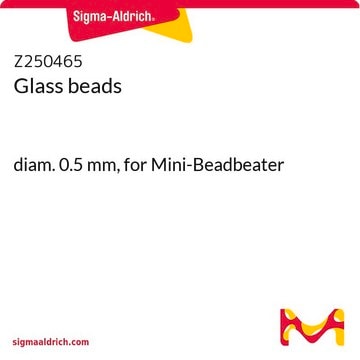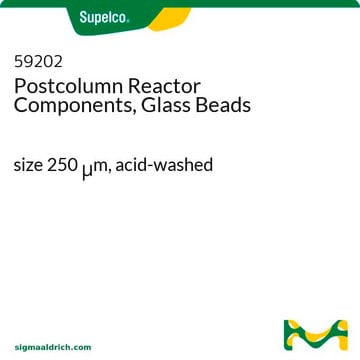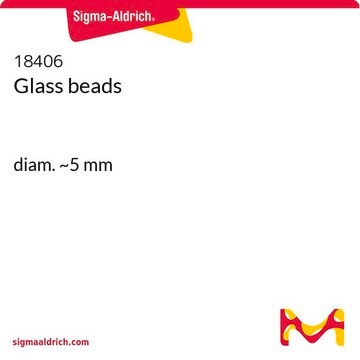G1277
Glass beads, acid-washed
212-300 μm (50-70 U.S. sieve)
Synonym(s):
Glass beads
Sign Into View Organizational & Contract Pricing
All Photos(4)
About This Item
UNSPSC Code:
41102422
NACRES:
NB.22
Recommended Products
particle size
212-300 μm (50-70 U.S. sieve)
Related Categories
Application
Acid-washed glass beads have been used:
- for the extraction of nucleic acids from pathogens
- for the preparation of Yarrowialipolytica cell extracts
- in chromatin immunoprecipitation assay of rat aorta tissues
Storage Class Code
11 - Combustible Solids
WGK
nwg
Flash Point(F)
Not applicable
Flash Point(C)
Not applicable
Personal Protective Equipment
dust mask type N95 (US), Eyeshields, Gloves
Certificates of Analysis (COA)
Search for Certificates of Analysis (COA) by entering the products Lot/Batch Number. Lot and Batch Numbers can be found on a product’s label following the words ‘Lot’ or ‘Batch’.
Already Own This Product?
Find documentation for the products that you have recently purchased in the Document Library.
Customers Also Viewed
A method for correcting underestimation of enteric pathogen genome quantities in environmental samples
Pengbo L, et al.
Journal of Microbiology (2021)
Nicholas M Briggs et al.
Nature communications, 9(1), 3827-3827 (2018-09-22)
Catalysts consisting of metal particles supported on reducible oxides exhibit promising activity and selectivity for a variety of current and emerging industrial processes. Enhanced catalytic activity can arise from direct contact between the support and the metal or from metal-induced
Valeria Di Dato et al.
Scientific reports, 5, 12329-12329 (2015-07-21)
Diatoms are among the most diverse eukaryotic microorganisms on Earth, they are responsible for a large fraction of primary production in the oceans and can be found in different habitats. Pseudo-nitzschia are marine planktonic diatoms responsible for blooms in coastal
Valeria Di Dato et al.
Scientific reports, 10(1), 5374-5374 (2020-03-28)
Prostaglandins (PGs) are hormone-like mediators in many physiological and pathological processes that are present in all vertebrates, in some terrestrial and aquatic invertebrates, and have also been identified in some macroalgae. They have recently been reported also in marine microalgae
Thomas Dubois et al.
mBio, 11(4) (2020-08-21)
The crust is the outermost spore layer of most Bacillus strains devoid of an exosporium. This outermost layer, composed of both proteins and carbohydrates, plays a major role in the adhesion and spreading of spores into the environment. Recent studies
Our team of scientists has experience in all areas of research including Life Science, Material Science, Chemical Synthesis, Chromatography, Analytical and many others.
Contact Technical Service














